高中英语必修3短语整理讲课稿
人教版高中英语必修3课件 知识点—— go ahead及go短语

go ahead及go短语
【知识点解析】
3.表示请对方先走或先做某事,其意为:你先走一步,
你先请。如:
You go ahead and tell him that we’re coming.
你先走一步,告诉他我们就来。
You go ahead. I’ll join you soon.
你们先开始,我一会儿就来(和你们一块儿干)。
5. go on to do sth. 接着做另外的事
He went on to watch TV after he had finished his homework. 6. go over检查;复习 When I came into the teacher’s room, our teacher is going over our homework.
A. Go ahead
C. No problem 答案:D
B. Good luck
D. Cheer up
解析:本题考查习语的使用。Go ahead 继续,发生,进行;Good luck“祝你好运”,一般用在句尾,表示对对方的祝福;No
problem 没问题;Cheer up (使)高兴起来,(使)振作起来;打
go ahead及go短语
【知识点解析】
2.表示继续或持续 表示请对方继续说、继续做等,通常可译为:继续……吧。
ห้องสมุดไป่ตู้
Go ahead, we’re all listening.
继续讲吧,我们都在听着呢! Go ahead, what are you waiting for? 往前走呀,你在等什么? A: Don’t interrupt me while I’m explaining the problems to you. 我在给你们解释这些问题时,请不要打断我的话。 B: All right, go ahead. 好,说下去吧。
人教课标版高中英语必修3【核心单词精讲课件】remind的用法

常用短语
remind of(v.+prep.) ▲remind sb of sb/sth/v-ing/wh-clause 1.就…提醒(某人) make sure that sb does not forget sth I reminded Facer of his promise.我向费塞提起他答应过的事。 A few days ago she reminded him of his pledge.前几天她提醒他做过的保证。 He reminded me of visiting the park.他提醒我已经参观过这个公园。 He reminded me of what I should otherwise have forgotten.亏他提醒了我,要 不然我就忘了。
词语辨异
remind sb to-v, remind sb of v-ing remind接双宾语时其直接宾语可以是动词不定式,也可以是介词短语 “of+v-ing”。它们之间的区别是:前者指将来发生的事情,而后者则指过 去发生过的事情。试比较以下两个句子: He reminded me to answer the letter. 他提醒我回这封信。 He reminded me of my answering the letter. 他提醒我已经回过这封信了
正误解析
3.秘书提醒我给妻子打个电话。 [误] The secretary reminded me of phoning my wife. [正] The secretary reminded me to phone my wife. 请提醒我明天吃药。 [误] Please remind me of taking my medicine tomorrow. [正] Please remind me to take my medicine tomorrow. 请提醒我把这些信寄出去。 [误] Please remind me of posting the letters. [正] Please remind me to post the letters. [析] “提醒某人做某事”,应该说remind sb to-v,用动词不定式充当宾 语补足语,而remind sb of v-ing表示“使某人想起做过某事”。
必修三高中英语说课稿
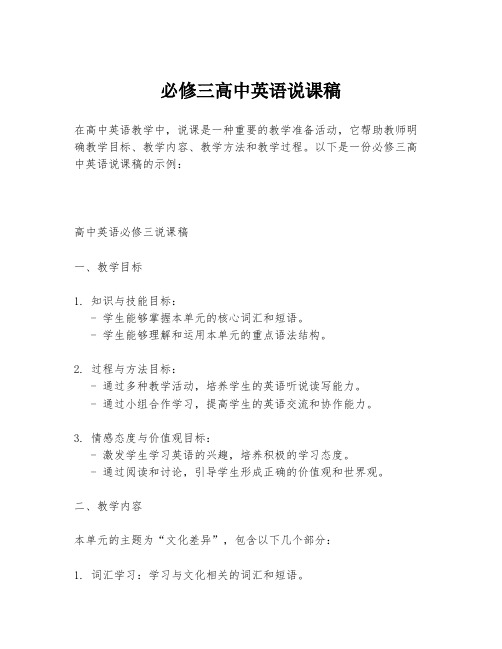
必修三高中英语说课稿在高中英语教学中,说课是一种重要的教学准备活动,它帮助教师明确教学目标、教学内容、教学方法和教学过程。
以下是一份必修三高中英语说课稿的示例:高中英语必修三说课稿一、教学目标1. 知识与技能目标:- 学生能够掌握本单元的核心词汇和短语。
- 学生能够理解和运用本单元的重点语法结构。
2. 过程与方法目标:- 通过多种教学活动,培养学生的英语听说读写能力。
- 通过小组合作学习,提高学生的英语交流和协作能力。
3. 情感态度与价值观目标:- 激发学生学习英语的兴趣,培养积极的学习态度。
- 通过阅读和讨论,引导学生形成正确的价值观和世界观。
二、教学内容本单元的主题为“文化差异”,包含以下几个部分:1. 词汇学习:学习与文化相关的词汇和短语。
2. 语法点:学习并掌握现在完成时态的用法。
3. 阅读材料:阅读关于不同文化习俗和价值观的文章。
4. 听力练习:听有关文化交流的对话或讲座。
5. 口语活动:进行角色扮演和讨论,练习英语口语表达。
6. 写作练习:写一篇关于文化差异的短文或日记。
三、教学重点1. 词汇和短语的准确使用。
2. 现在完成时态的语法结构及其在实际语境中的应用。
四、教学难点1. 学生对文化差异的理解可能存在偏差,需要引导学生正确认识和尊重不同文化。
2. 现在完成时态的灵活运用可能对部分学生来说较难掌握。
五、教学方法1. 任务型教学法:通过设计具体的任务,让学生在完成任务的过程中学习语言。
2. 合作学习法:鼓励学生进行小组合作,共同探讨和解决问题。
3. 情景教学法:创设真实的语言使用情景,提高学生的语言实际运用能力。
六、教学过程1. 导入(5分钟):通过图片或视频激发学生对文化差异的兴趣。
2. 词汇学习(10分钟):教授本单元的核心词汇和短语,并通过练习加深理解。
3. 语法讲解(15分钟):详细讲解现在完成时态的用法,并进行例句分析。
4. 阅读指导(20分钟):指导学生阅读材料,理解文章内容,并讨论文化差异。
高中英语必修3第4单元重点单词和短语讲解
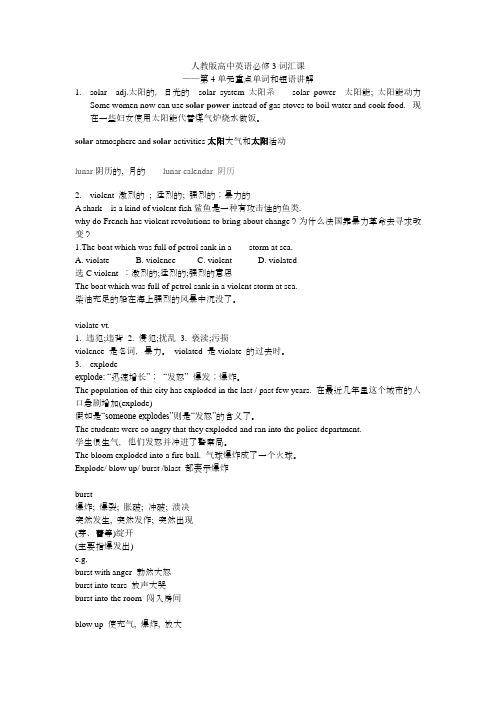
人教版高中英语必修3词汇课——第4单元重点单词和短语讲解1.solar adj.太阳的,日光的solar system太阳系solar power 太阳能; 太阳能动力Some women now can use solar power instead of gas stoves to boil water and cook food. 现在一些妇女使用太阳能代替煤气炉烧水做饭。
solar atmosphere and solar activities 太阳大气和太阳活动lunar阴历的, 月的lunar calendar阴历2.violent 激烈的; 猛烈的; 强烈的;暴力的A shark is a kind of violent fish鲨鱼是一种有攻击性的鱼类.why do French has violent revolutions to bring about change?为什么法国靠暴力革命去寻求改变?1.The boat which was full of petrol sank in a ___ storm at sea.A. violateB. violenceC. violentD. violated选C violent :激烈的;猛烈的;强烈的意思The boat which was full of petrol sank in a violent storm at sea.柴油充足的船在海上强烈的风暴中沉没了。
violate vt.1. 违犯;违背2. 侵犯;扰乱3. 亵渎;污损violence 是名词,暴力。
violated 是violate 的过去时。
3.explodeexplode: “迅速增长”;“发怒” 爆发;爆炸。
The population of this city has exploded in the last / past few years. 在最近几年里这个城市的人口急剧增加(explode)假如是“someone explodes”则是“发怒”的含义了。
单元词汇及短语学习课件-2023学年高中英语人教版(2019)必修第三册

faithfully adv.虔诚地
13. occasion n.特别的事情(或仪式、庆典);(适当的)机会→
occasional adj.偶然的,偶尔的→ occasionally adv.偶尔;间或
14. pleased adj.高兴的;满意的→ pleasant adj.令人愉快的→
please vt.使满意;使愉快→ pleasure n.愉快;令人高兴的事
4. figure
n.人物;数字;身材
vt.认为;认定
5. harvest n.收获季节;收获;收成
vi.& vt.收割(庄稼);捕猎(动物、鱼)
6. Gather vi.聚集;集合
vt.聚集;搜集;收割
7. feature vt.以……为特色
n.特色;特征;特点
8. fade
vi.& vt.逐渐消失;(使)褪色;(身体)变得虚弱
16.passive adj. 被动的;顺从的
17.insurance n. 保险;保险业
18.midnight n. 子夜;午夜
பைடு நூலகம்
19.import n. 进口;进口商品
vt.
进口;输入;引进
20.export n. 出口;出口商品
vt.
出口;输出;传播
21.pole n. (行星的)极;地极
p n.
in common (有相同的特征).They hope to be given lucky money and are looking forward to the wonderful future.7. To be frank (坦率地说),though some of the old traditions have 8. faded away (逐渐消失)with time passing by,the celebration of the Spring Festival will keep up.
人教版高中英语必修3知识点语法短语课文详解

英语必修3Unit 1 Festivals around the World世界各地的节日1.mean doing sth. 意味着;mean to do sth. 打算或企图做某事;mean sb. to do sth. 打算让某人做某事be meant for 打算作……用; 为…而有2.take place 发生;举行3.of all kinds 各种各样的4.starve to death饿死be starved of 缺乏,starve for sth, starve to do,渴望5.plenty of 大量; 充足6.be satisfied with感到满意to one’s satisfaction感到满意是7.do harm to sb.=do sb. harm 伤害某人8.in the shape of呈…的形状,以…的形式9.in memory of/ to the memory of sb.纪念某人10.dress up 穿上最好的衣服;打扮,化装11.award sth.(to sb.)和award sb.sth.(for sth.) 给予、颁奖reward sb. for sth. 因…奖赏某人;reward sb. with sth. 用某物酬劳某人12. admire sb. for sth在某方面钦佩某人13.look forward to期望,期待,盼望14,have fun with(与某人)玩得开心;过得快乐( have a good time, enjoy oneself.)15. turn up.来;出现;把(收音机等)音量开大些turn down 拒绝; turn off 关掉;turn on 打开; turn out 结果是......turn to sb. for help 向某人求助16.keep one’s word 守信用;break one’s word, 失信17.It be obvious that-clause显而易见;一目了然18.set off动身, 出发; 使(地雷、炸弹)爆炸;set in开始; set up建立,创立;set out to do = set about doing sth.着手做set down 写下,记下19.remind sb. of sth. 提醒,使想起II.Reading FESTIV ALS AND CELEBRATIONS节日与庆祝Festivals and celebrations of all kinds have been held everywhere since ancient times.译文:从古自今各地都举行过各式各样的节日和庆典。
必修三英语unit3说课稿
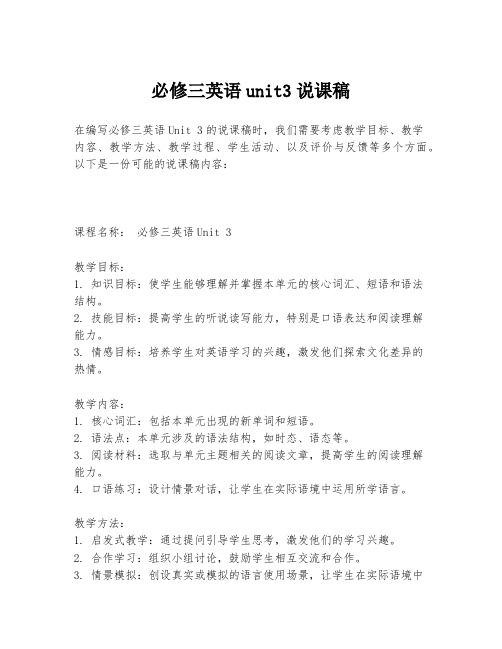
必修三英语unit3说课稿在编写必修三英语Unit 3的说课稿时,我们需要考虑教学目标、教学内容、教学方法、教学过程、学生活动、以及评价与反馈等多个方面。
以下是一份可能的说课稿内容:课程名称:必修三英语Unit 3教学目标:1. 知识目标:使学生能够理解并掌握本单元的核心词汇、短语和语法结构。
2. 技能目标:提高学生的听说读写能力,特别是口语表达和阅读理解能力。
3. 情感目标:培养学生对英语学习的兴趣,激发他们探索文化差异的热情。
教学内容:1. 核心词汇:包括本单元出现的新单词和短语。
2. 语法点:本单元涉及的语法结构,如时态、语态等。
3. 阅读材料:选取与单元主题相关的阅读文章,提高学生的阅读理解能力。
4. 口语练习:设计情景对话,让学生在实际语境中运用所学语言。
教学方法:1. 启发式教学:通过提问引导学生思考,激发他们的学习兴趣。
2. 合作学习:组织小组讨论,鼓励学生相互交流和合作。
3. 情景模拟:创设真实或模拟的语言使用场景,让学生在实际语境中练习语言。
教学过程:1. 导入(Lead-in):通过图片、视频或问题引入单元主题,激发学生的好奇心。
2. 新课呈现(Presentation):介绍新词汇和语法点,通过例句和解释帮助学生理解。
3. 练习(Practice):设计形式多样的练习,如填空、改错、翻译等,巩固学生对新知识的理解。
4. 应用(Application):通过角色扮演、情景对话等活动,让学生在实际语境中运用所学知识。
5. 总结(Summary):回顾本节课的重点内容,确保学生对知识点有清晰的认识。
学生活动:1. 个人作业:完成课后练习,加深对知识点的理解和记忆。
2. 小组合作:参与小组讨论,共同完成指定任务,提高团队协作能力。
3. 展示(Presentation):在班级前展示小组讨论的成果,锻炼口语表达能力。
评价与反馈:1. 形成性评价:通过课堂观察、小组讨论和个人作业等方式,了解学生的学习进度和理解程度。
人教版高中英语选择性必修第三册unit3复习课件

现在进行
时
现在完 成时
现在完成 进行时
1
2
3
4
过 去
一般过去时
过去进 行时
过去完 成时
过去完成 进行时
4.“Recently,I have been working on my article on pollution,”he
saቤተ መጻሕፍቲ ባይዱd.
将 来
一般将来时 He said that he _____h_a_d_b_e_e_n____ on his article on pollution
4
过去完成 进行时
1.Tom said,“I am busy.”
将 来
一般将来时
Tom said that hew_a_s__ busy.
2.The boy said,“I'm using a knife.”
5
The boy said that hew__a_s__u_s_i_n_g__a knife.
8.conservation n.对(环境、文物等)保护;保持 →conservative adj.保守的;守旧的→conserve v.保护;保存 ;节省;节约 9.inspection n.检查;查看;视察→inspect vt.检查;视察; 检阅→inspector n.检察员;督察员 10.tolerate vt.忍受;包容;容许→tolerant adj.宽容的;容忍 的→tolerance n.容忍
1)人称的变化(一主,二宾,三不变)
a). He said, “ I like it very much.” He said that he liked it very much
b) I said to him, “You've left your book in my room.”
高中英语必修三词组总结

高中英语必修三词组总结一、名词短语1. a great deal of 大量的,许多2. a variety of 各种各样的3. take advantage of 利用,占便宜4. put an end to 结束5. a number of 许多,大量的6. be aware of 意识到,知道7. go to great lengths 努力,费尽心思8. as a result of 由于,因为9. at present 现在,目前10. as well as 也,和……一样二、动词短语1. pay attention to 注意,关注2. have an impact on 对……有影响3. take measures 采取措施4. develop good habits 养成良好的习惯5. make a difference 有影响,起作用6. get along with 与……相处7. give rise to 导致,引发8. adapt to 适应9. be concerned about 关心,担心10. play a role 发挥作用三、形容词短语1. in common 共同的,共有的2. be engaged in 从事,参与3. be addicted to 对……上瘾4. be capable of 能够,有能力5. be familiar with 熟悉,了解6. be responsible for 对……负责7. be satisfied with 对……满意8. be eager to 渴望,热切9. be aware of 意识到,知道10. be grateful to 感激,对……心怀感激四、副词短语1. in general 一般来说,总的来说2. on the contrary 相反地3. in particular 特别地,尤其4. at the same time 同时5. by all means 无论如何,务必6. as a matter of fact 事实上,实际上7. on purpose 故意地8. at first 首先,起初9. in addition 此外,另外10. at least 至少,最少五、介词短语1. in contrast to 与……相反2. in favor of 支持,赞成3. on behalf of 代表4. at the expense of 以……为代价5. in terms of 根据,按照6. out of control 失控7. with regard to 关于8. at the risk of 冒着……的风险9. as for 至于,关于10. in search of 寻找六、连词短语1. as a result 结果,因此2. in conclusion 总之,最后3. on the other hand 另一方面4. due to 因为,由于5. as long as 只要6. so that 以便,为了7. in addition to 除了……之外8. as if 好像,似乎9. even if 即使10. rather than 而不是这些词组的掌握对于高中英语学习非常重要,希望同学们能够通过不断的实践和运用,提高自己的语言表达能力。
高一英语 外研版必修三 Unit 2 P20-24单词、短语及课文
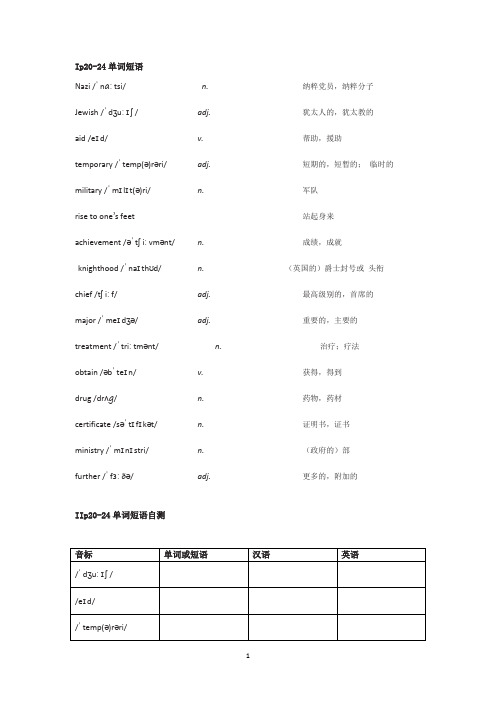
Ip20-24单词短语Nazi /ˈnɑːtsi/ n.纳粹党员,纳粹分子Jewish /ˈdʒuːɪʃ/ adj.犹太人的,犹太教的aid /eɪd/ v.帮助,援助temporary /ˈtemp(ə)rəri/ adj.短期的,短暂的;临时的military /ˈmɪlɪt(ə)ri/ n.军队rise to one’s feet 站起身来achievement /əˈtʃiːvmənt/ n.成绩,成就knighthood /ˈnaɪthʊd/ n.(英国的)爵士封号或头衔chief /tʃiːf/ adj.最高级别的,首席的major /ˈmeɪdʒə/ adj.重要的,主要的treatment /ˈtriːtmənt/ n.治疗;疗法obtain /əbˈteɪn/ v.获得,得到drug /drʌɡ/ n.药物,药材certificate /səˈtɪfɪkət/ n.证明书,证书ministry /ˈmɪnɪstri/ n.(政府的)部further /ˈfɜːðə/ adj.更多的,附加的IIp20-24单词短语自测III根据语境填写单词或短语1.a method that is intended to cure an injury or illness. _______sting for only a limited period of time _______3.most important , main _______4.something important you succeed in doing by your own efforts. _______5.a special rank or title given to someone by the king or queen in Britain. _______6.(American spoken)very important _______7.a member of National Socialist Party of Adolf Hitler which controlled Germany from 1933-1945._______ed by or connected with war, army , navy, or airforce. _______9.more or additional _______10.connected with Jewess or Jewry . _______11.an official documents that states that a fact or facts are true. _______12.a government department that is responsible for one of the areas of government work, such as education, health or defence . _______13.a medicine or substance for making medicines. _______14.to help someone or something by making their situation easier. _______15.to stand up. _______答案:1.treatment2.temporary3.chief4.achievement5.knighthood6.major7.Naziitary9.further 10.Jewish11.certificate 12.drug 13.aid 14.rise to one’s feetIV P20-21课文THE POWER of GOOD“The British Schindler”: the life of Nicholas Winton1 It is August 1939, and a group of frightened children are boarding a train at Prague’s WilsonStation. Their heartbroken parents do not join them. Indeed, they fear they may never see their children again. But they know that their children will live. These are among the 669 children, most of them Jewish, that Nicholas Winton will go on to save from death at the hands of the Nazis.2 Nicholas Winton was born on 19 May 1909 in London, to German-Jewish parents. The familylater took British nationality. On leaving school, Winton worked in banks in Germany and France.He returned to Britain in 1931, where he worked in business.3 In December 1938, a friend asked Winton to come to Prague to aid people who were escapingfrom the Nazis. In Prague, Winton saw people living in terrible conditions and whose lives werein danger. He decided to help transport children to safety in Britain. He established an office tokeep records of the children, and then returned to Britain to find temporary homes for them. Heused donated funds and his own money to pay the 50 pounds per child that the British government required. By August 1939, Winton had saved 669 children.4 During World War II, Winton served as an officer in Britain’s Royal Air Force. He left the military in 1954. He then worked for international charities and for various companies. For the most part, he did not mention the children he saved, and his actions soon disappeared from people’s memories.5 That all changed in 1988 when his wife Grete found a forgotten journal at home. The journal contained photographs and names of the children and addresses of the families that took them in. She sent the journal to a newspaper, and that year Winton was seen on the British television programme That’s Life. At one point, the host asked people in the audience to stand up if Nicholas Winton had saved their lives. A shocked Winton watched as the majority of people rose to their feet. The programme brought his actions to public attention, and Winton became a respected figure around the world.6 Later, Winton received various honours for his achievement, including a knighthood in 2003, and the Czech government’s highest honour, the Order of the White Lion, in 2014.7 Nicholas Winton passed away on 1 July 2015, at the age of 106. As the Chinese saying goes, “A kind-hearted person lives a long life”V课文内容填空1 It is August 1939, and a group of frightened children 1________(board) a train at Prague’sWilson Station. Their heartbroken parents do not join them. Indeed, they fear they may never see their children again. But they know that their children will live. These are 2_______ the 669 children, most of 3_______ Jewish, that Nicholas Winton will go on to save from death 4_______ the hands of the Nazis.2 Nicholas Winton was born on 19 May 1909 in London, 5_______ German-Jewish parents. The family later took British 6________(nation). On leaving school, Winton worked in banks in Germany and France. He returned to Britain in 1931, where he worked in business.3 In December 1938, a friend asked Winton to come to Prague to aid people who were escaping from the Nazis. In Prague, Winton saw people living in terrible conditions and whose lives were in danger. He decided to help transport children to 7_______ in Britain. He established an office to keep records 8_______ the children, and then returned to Britain to find temporary homes for them. He used 9________(donate) funds and his own money to pay the 50 pounds per child that the British government required. By August 1939, Winton 10_______(save) 669 children.4 During World War II, Winton served 11________ an officer in Britain’s Royal Air Force. He left the military in 1954. He then worked for international charities and for 12________(vary) companies. 13________ the most part, he did not mention the children he saved, and his actions soon disappeared from people’s memories.5 That all changed in 1988 when his wife Grete found a 14________(forget) journal at home. The journal contained photographs and names of the children and addresses of the families that took them in. She sent the journal to a newspaper, and that year Winton was seen on the British television programme That’s Life. At one point, the host asked people in the audience to stand up if Nicholas Winton had saved their lives. A 15________(shock) Winton watched as the majority of people rose 16________ their feet. The programme brought his actions 17________ public attention, and Winton became a respected figure around the world.6 Later, Winton received various honours for his 18________(achieve), including a knighthood in 2003, and the Czech government’s highest honour, the Order of the White Lion, in 2014.7 Nicholas Winton passed away on 1 July 2015, at the age of 106. As the Chinese saying 19_________,“A kind-hearted person lives a long life”。
wy 人教必修三 book 3 unit 1 Festivals and celebrations 语言知识讲解 language points
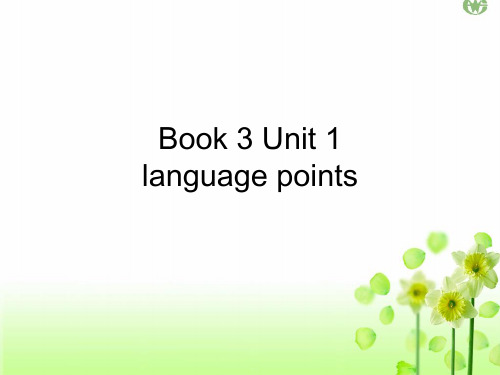
有些节日是为了纪念死者或使祖先得到满足, (因为)祖先有可能回到世上(给人们)提供帮 助,也有可能带来危害。
satisfy satisfy one’s need satisfied
satisfying satisfaction
For the Japanese festival Obon, people should go to clean the graves and light incense in memory of their ancestors.
• China and Japan have minautumn festivals, when people admire the moon and in China, enjoy mooncakes. • 中国和日本都有中秋节,这时人们会赏月, 在中国人们还品尝月饼。
• admire vt. 赞美;钦佩;羡慕;夸奖 • 欣赏美景 • Admire the view
[多角度演练]
1.用所给动词的适当形式填空 ①I look forward to hearing (hear) from you as soon as possible. ②The day that he had looked forward to came (come) at last. ③He looked forward to
[多角度演练]
1.写出下面句中dress up的含义 ①We all dressed up for the party but she was still in her 盛装 ordinary clothes. ②My wife is always dressing up in front of the mirror before 打扮 she goes to work. ③We shall dress the room up for Christmas. 装饰 2.完成句子 ④我们为参加学校的圣诞舞会而盛装打扮。 We dressed up for the school ball on Christmas Day. ⑤我在宴会上见到他身着红衣,帅气十足。 He was smartly dressed in red when I saw him at the dinner.
高中英语必修三第一单元讲义说课材料

Unit one Festivals around the world1、Discuss when they take place. 讨论一下它们什么时候发生。
take place 发生When did the wedding take place? 婚礼是什么时候举行的。
The opening of the play will take place tomorrow night. 这出戏明天晚上开始演出。
易混辨析:happen; take place; break out 发生今天早上大街上发生了一起交通事故。
过去三十年中国发生了巨大变化。
第一次世界大战1914年爆发。
特别提示:(1)happen; take place; break out 都没有被动式。
(2)take the place of表示“代替…的位置”。
即时活用:1、A terrible accident ______ on No.6 Street yesterday, where a couple were killed by a truck.A. foldedB. broke outC. took placeD. occurred2、A quarrel ___________ last Sunday, and he ___________ his family.A. was broken out; broke awayB. broke out; broke awayC. was broke out; broke away fromD. broke out; broke away from3、Don’t you believe it! Glass can ________ steel in many ways in life.A. take place ofB. take the place ofC. in place ofD. instead of4、The question occurred to me ______ we were to get the machines mended.A. thatB. whatC. whyD. where5、–When did the concert_____?---Oh, two days ago.A. happenedB. take placeC. holdD. start2、At that time people would starve if food was difficult to find, especially during the cold winter months.那个时候如果食物难找人会饿死的,尤其是寒冷的冬天。
人教版高中英语必修三全部单词短语
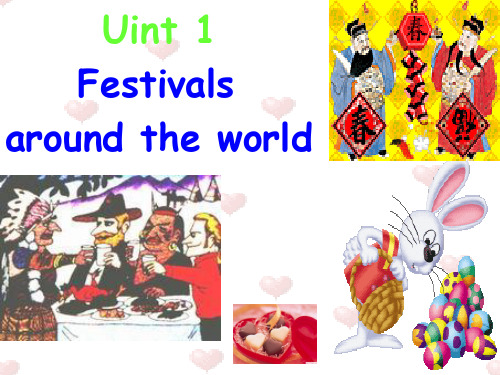
盛宴,节日 骨,骨头 信任,信仰 盛装,打扮 诡计,恶作剧,欺骗 搞恶作剧
诗人
到达者,到来 获得,得到 独立,自主 独立的,自主的 搜集,集合,聚集
feast bone belief dress up trick play a trick on poet arrival gain independence independent gather
32. raw
32. 生的,未加工的
33. vinegar
33. 醋
34. get away with 34. 被放过, 不受惩罚
35. lie
35. 谎话,谎言
36. tell a lie
36. 说谎
37. customer
37. 顾客,消费者
38. discount
38. 折扣
39. win… back 39. 赢回, 重新获得
人教版高中英语必修三全部单词短语第一页课件共有35页发生美美美人收获收割庆祝祝贺使饿死起源由来起因宗教的虔诚的季节性的祖先祖宗坟墓墓地纪念追念墨西哥takeplacebeautyharvestcelebrationstarveoriginreligiousseasonalancestorgraveinmemoryofmexico第二页课件共有35页盛宴节日骨骨骨头信任信仰盛装打扮诡计恶作剧欺骗搞恶作剧诗人到达者到来获得得到独立自主独立的自主的搜集集合聚集feastbonebeliefdressuptrickplayatrickonpoetarrivalgainindependenceindependentgather第三页课件共有35页农业农艺农学农业的农艺的奖品授予判定农产品雄禽公鸡赞美钦羡羡慕充满活力的积极的期待盼望狂欢节月的月亮的复活节游行阅兵检阅agricultureagriculturalawardproduceroosteradmireenergeticlookforwardtocarnivallunareasterparade第四页课件共有35页日夜昼夜整天衣服基督徒基督教的耶稣樱桃樱桃树花花开花好象玩得开心习惯习俗世界性的愚人愚弄傻的必要性需要dayandnightclothingchristianjesusherryblossomasthoughhavefunwithcustomworldwidefoolnecessity第五页课件共有35页许可允许预言预报预告时尚汽车等停放停车场情人节出现到场守信用履行诺言屏气屏息道歉辩白淹没溺死淹死悲哀悲伤permissionpredictionfashionparkingparkinglotvalentinesdayturnupkeeponeswordholdonesbreathapologizedrownsadness第六页课件共有35页显而易见的擦擦揩擦去编织使迂回前进牧群兽群哭泣流泪广播员告知者报幕员出发动身使爆炸提醒使想起使
人教版高中英语必修3课件 知识点—— go through及go+adv.prep.型短语、v.+through型短语
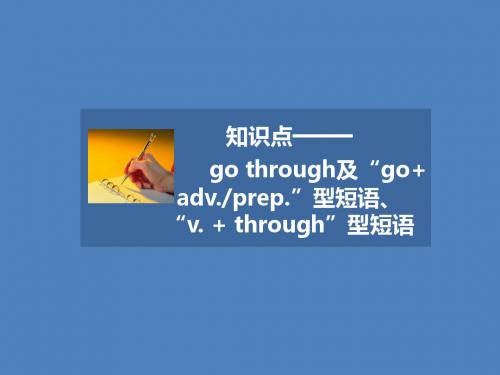
何困难。故选C.
go through及“go+ adv./prep.”型短语、“v. + through”型短语
【典型例题】
3. The early pioneers had to _____ many difficulties to settle down
on the new land. A. get along with C. go over 答案:D B. go after D. go through
go through及“go+ adv./prep.”型短语、“v. + through”型短语
【知识点解析】
The plan must go through several stages.
这个计划必须经过几个阶段才能通过。
(5)仔细检查,审查 She went through her jacket pockets and eventually found the keys. 她仔细检查了她的夹克衫口袋,终于找到了钥匙。
知识点—— go through及“go+ adv./prep.”型短语、 “v. + through”型短语
go through及“go+ adv./prep.”型短语、“v. + through”型短语
【知识点解析】
一、go through的用法 (1)通过,穿过 He went through a forest. 他穿过了一片森林。 (2)遭受,经历,忍受 He was going through a very difficult time.
He has got through ¥1000 in less than two months.
高中英语必修三中英文说课稿全套

必修3unit 1说课稿一Festivals around the World张北一中高一年级:李霞人教版必修3一说教材1.教材的地位和作用:Festivals around the world是人教版新课标高中英语必修三第一单元的内容。
本单元围绕festivals around the world(世界各地的节日)这一主题展开进行听、说、读、写等多种教育活动。
让学生不仅对本国的节日增进理解,而且对外国的节日也有所感悟,从而提高学生的社会文化素质,加强跨国文化意识。
2. 教学目标:(1)知识与技能:①简述各国节日的由来、作用以及人们在节日中的习俗表现;②掌握生词、词组、句型的用法。
(2)过程与方法①通过开展小组活动以及提问讨论的方式,引导学生积极与人合作,相互学习帮助,培养团队意识;②通过同学与老师之间的交流,在教学过程中提高语言表达能力,初步培养学生活学活用的能力。
( 3 ) 情感态度与价值观了解世界文化的多样性以及增强对本国传统特色文化的保护意识,,增强跨文化交际能力。
3. 教学重难点:重点:①了解世界各地各种的节日名称、起源以及庆祝方式等;②学习并掌握本课单词以及短语。
二说学情“节日”是学生既熟悉又比较感兴趣的话题,因此可以激发学生的求知欲,更深层次的理解本课内容。
但由于课文也涉及到西方文化,学生学习和理解有一定难度。
三说教法学法1.教法基于本课题的特点,决定采用以任务教学法为主,以问答法、讨论法为辅的教学方法。
2. 学法学法上,我提倡“把学习的主动权还给学生”,教会学生主动预习、自主思考、系统小结;同时进行“自主、合作、探究”的学习方式,具体为讨论法、朗读法和勾画圈点法。
3. Teaching aids(教具):多媒体和常规教具。
四教学过程:Step1 Warming-up1.Greetings: Good morning, boys and girls .Happy New Year.2.Talk about winter vocation: Good morning .Happy New Year.设计意图:通过谈论新年,从而引入本单元的话题:festivals around the world. Step2.Leading-in(导入)首先通过幻灯片展示几幅图片,均为一些与节日有关的图片,要求学生对以下问题进行思考并讨论:1.说一下图片中都展示的是哪个节日?2.人们在节日中都做什么?3.你还知道中国的或外国哪些节日?人们怎么来庆祝这些节日?设计意图:1.通过谈论中外的不同节日,既让学生了解了中国的风俗习惯,唤起学生的爱国情感和民族自豪感,又了解到世界文化风俗,加强跨文化意识。
全英文说课稿及完整标准教案必修3Unit3.doc
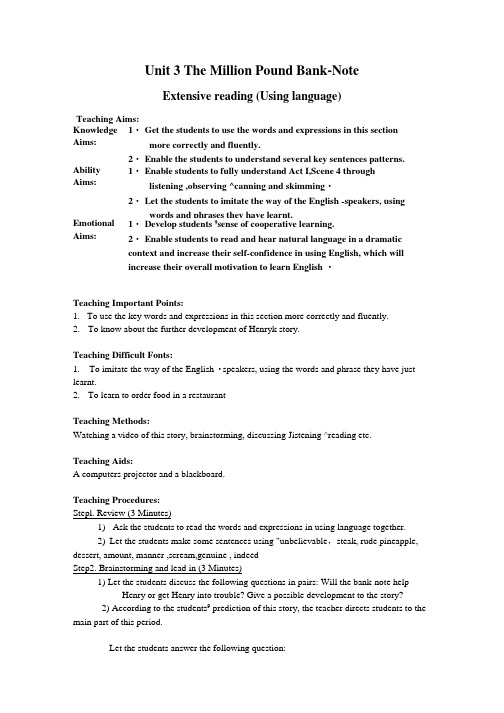
Unit 3 The Million Pound Bank-NoteExtensive reading (Using language) Teaching Aims:Knowledge Aims:1・ Get the students to use the words and expressions in this section more correctly and fluently.2・ Enable the students to understand several key sentences patterns.Ability Aims:1・ Enable students to fully understand Act I,Scene 4 through listening ,observing ^canning and skimming・2・ Let the students to imitate the way of the English -speakers, using words and phrases they have learnt.Emotional Aims:1・ Develop students 9sense of cooperative learning.2・ Enable students to read and hear natural language in a dramatic context and increase their self-confidence in using English, which will increase their overall motivation to learn English ・Teaching Important Points:1.To use the key words and expressions in this section more correctly and fluently.2.To know about the further development of Henryk story.Teaching Difficult Fonts:1.To imitate the way of the English ・speakers, using the words and phrase they have just learnt.2.To learn to order food in a restaurantTeaching Methods:Watching a video of this story, brainstorming, discussing Jistening ^reading etc.Teaching Aids:A computers projector and a blackboard.Teaching Procedures:Stepl. Review (3 Minutes)1)Ask the students to read the words and expressions in using language together.2)Let the students make some sentences using "unbelievable,steak, rude pineapple, dessert, amount, manner ,scream,genuine , indeedStep2. Brainstorming and lead in (3 Minutes)1) Let the students discuss the following questions in pairs: Will the bank-note helpHenry or get Henry into trouble? Give a possible development to the story?2) According to the students9 prediction of this story, the teacher directs students to the main part of this period.Let the students answer the following question:What would happen to Henry at the restaurant?A. He was not taken seriously.B. He was treated politely.Step3. Listening and reading,watching and acting (30Minutes) l)Listening and reading (15 Minutes )(a )Listening to the recording of Actl,Scene4,(b )After listening to the story, and check the answer, and ask students work in pairs to discuss why would it happen in this way.(c )Let the students scan the text quickly and then complete the True or False question:(1 )The owner looked down upon Henry when he noticed Henry's appearance.(2 )Henry asked for more of the same food because he is an American who likes to eat a lot.(3 )When Henry saw the million pound bank-note, he was happy and proud of it.(4)The owner didn't believe the bank・not was real and he asked Henry to get out of the restaurant.Check the answers with the students : T F F F2)Watching and acting(15 Minutes )(a )After students have familiar with the passage, let them watch a video which is about the passage and ask students pay attention to the characters^ pronunciation.(b )Role play. Ask student to work in groups and act the text out.Step 4. Homework (4Mimutes ):Find out more information about The Million Pound Banknote and write down the part which haven't told in this Unifs reading parts and which you think is interesting.Blackboard Design:1.Some useful words and phrases.2.Thoughts about students9 prediction and discussions.3.Key characters^ names in this passage.Feedback:Positive sides: Further improving sides:Hello, everyone. My name is Zhang Huan. Ifs been a great pleasure for me to stand here to give my presentation. My topic is The Million Pound Bank-Note, which is taken from unit3 in New Senior English For China Studenfs Book3. And my contents consist of 9 parts. They are as following:1.Analysis of the teaching material2.Analysis of the students3.Teaching methods4.Teaching aims and demands5.Teaching important and difficult points6.Teaching aids7.Teaching procedures& Blackboard design9. FeedbackWell, to begin with, I will talk about the first part —analysis of the teaching material.This unit is about a play based on a short story by an American writer—Mark Twain, it focuses on Actl, Scene3 and 4 and nearly all the teaching materials center on it. The author shows the characteristics of the hero , the two brothers and the owners of the restaurant,showing several feelings ,thus leading students to know how to try acting the play out to practise their oral English . Thus based on the theme ,contents and teaching objectives,my presentation will focus on Actl, Scene4, which plays as the Using Language part in this unit. Through learning of this part, students are able to know more about the story between Henry and the two brothers.Secondly, I would like to say something about the analysis of the students. My students have already learnt New Senior English For China Studenfs Bookl and 2 and have formed a general idea about High school English and have formed their habits to learn English. Although they know English become much more difficult than in Middle school, but if they have figured out their own way to improve their English under the help of their English teachers, English learning process will also have a lot of fun. Students in this period are becoming serious about their study and would learn English actively and eagerly . So English teachers at this time need to make English learning as interesting as possible, so students would enjoy learning English at the same time to improve their grades. In order to make English learning interesting,I will design some funny and efficient activities to activate the class and let as many students as possible to participate in the activities.Thirdly f in this period, I will mainly adopt Task-based Language Teaching method and Situational Language Teaching method. The story in this unit has created a vivid scene to cultivate students' listening and speaking abilities. As the result of its combination of language and environment, the scene can enhance students' perceptual understanding of English language ・While TBLT helps to enhance students' confidence and promote their collaborative learning・ Through pair work, group work or role -play, TBLT creates a relaxed climate which helps students to overcome anxiety, reduces psychological tension and gives students confidence to try out whatever language they know. Group work or pair work involves mutual support and interdependence, and such an embracing atmosphere promotes their cooperation because it enables them not only to practice language but also to learn from each other.Fourthly, let's move on to the next part, teaching aims and demands・ There are knowledge aims, ability aims and emotional aims: 1) Knowledge aims are to get the students to use the words and expressions in this section more correctly and fluently and enable the students to understand several key sentences patterns. 2) Ability aims are to enable students to fully understand Actl ,Scene 4 through listening, observing scanning and skimming and to imitate the way of the English -speakers, using words and phrases they have learnt. 3) Last but not least, the emotional aims are to develop students "sense of cooperative learning and to read and hear natural language in a dramatic context and increase their self-confidence in usingEnglish, which will increase their overall motivation to learn English ・Fifthly, now here comes the teaching important and difficult points. The key points are to use the key words and expressions in this section more correctly and fluently and to know about the further development of Henryk story. As for the difficult points, students are expected to imitate the way of the English ・speakers, using the words and phrases they have just learnt and to learn to order food in a restaurant.Sixthly, in this period I will use blackboard, chalks, a computer and a projector.Seventhly, I am going to talk about the most important part: teaching procedure, which consists of 4 steps.Step 1 is ReviewI will first ask the students to read the words and expressions in using language together and ask several students to stand up to translate several Chinese sentences into English by using these words, which will take about 3minutes.Step 2 is Brainstorming and lead in.Let the students discuss the questions in pairs and predict what would happen to Henry, which will take about 3 minutes.Step 1 and 2 are used to check studenfs homework and to prepare for the following part.Step 3 is the main part in this period and I divided it into two parts: The first part is listening and reading. This part will make students familiar with the story by listening, reading and answering several detailed questions, which will also train and consolidate their listening and reading skill. This part will be controlled in 15 minutes. The second part is watching and acting, which will also take about 15 minutes. Students will watch an interesting video about the story and try to listen to and observe the characters carefully, after watching it students need to work in groups to imitate the video and act the scene out.This part is the most interesting and difficult part, I need to pay attention to students9 feedback and to make suitable response to it, and to make the class atmosphere actively but not out of the control.Here goes step 4 一HomeworkAsk the students to find out more information about The Million Pound Banknote and write down the part which haven't told in this Unit's reading parts and which students themselves think is interesting.This is the last part of the teaching procedures.As for blackboard design, I will write down some useful and important words and phrases. I will also write down some students discussions and predictions which I think will help other students understand them better. When it comes to Role・play part, I will also write the main characters9 names on the blackboard in order to help students to understand who acts whom.After the class have finished, I will write down the positive sides of this class and the furtherimproving sides of my class. I think feedbacks are always playing an important role to a responsible teacher, which is key to be a better English teacher.I decided to be an English teacher as my life-time career is because of my favorite teacher—Zhang Zuotang in university who never stops to learn enormously and devotes his lift to Chinese education. He gains his sense of meaningfulness from sharing his knowledge with his students and trying his best to brighten their world. I was deeply touched by his hard-working story and influenced by his positive attitudes towards life and work, so here I am. Thank you for you attention, and thafs all.。
- 1、下载文档前请自行甄别文档内容的完整性,平台不提供额外的编辑、内容补充、找答案等附加服务。
- 2、"仅部分预览"的文档,不可在线预览部分如存在完整性等问题,可反馈申请退款(可完整预览的文档不适用该条件!)。
- 3、如文档侵犯您的权益,请联系客服反馈,我们会尽快为您处理(人工客服工作时间:9:00-18:30)。
高中英语必修3短语
整理
高中英语必修3短语
Unit1
1、be meant to do sth. 必须/应该/注定/意味着做某事;旨在做某事
2、mean doing sth. 意味着做某事 mean to do sth. 打算做某事
3、指对某人取得的成就或喜庆之事表示“祝贺,庆贺”,其宾语是“人”,常用于congratulate sb.on(doing)sth..结构
4、celebration n.庆祝;祝贺
5、take place 发生
6、starve to death 饿死
7、in memory of 纪念;追念
8、either…or…要么……要么……;不是……就是……(表示两者之一,连接两个并列的成分)就近
9、be/get dressed in…穿着……的衣服
10、play a trick/tricks on sb. 搞恶作剧;开玩笑
11、gather together 聚在一起
12、admire sb. for sth. 因某事羡慕某人
13、admiration n.钦佩;赞美;羡慕
14、look forward to 期望;期待;盼望
15、day and night 日夜;昼夜;整天
16、have fun with sb. 与某人玩得开心
17、with one’s permission 经某人允许
18、permit/allow doing sth. 准许做某事
19、turn up 出现;到场
20、turn up 开大……音量;卷起;找到;发现turn on 打开
turn off 关上
turn down 放小音量;拒绝
turn into 变成;变得
turn out 结果是
turn to 求助于
21、keep one’s word 守信用;履行诺言
22、break one’s word 失信
have a word with sb. 与其人谈话
have word with sb. 与其人吵架
in other words 换句话说
in a word 简言之
23、hold one’s breath 屏息;屏气
24、out of breath 气喘吁吁地breathless adj.呼吸困难的
25、apologize to sb. for(doing)sth. 因(做)某事向某人道歉
26、make/offer an apology to sb. for(doing)sth. 因(做)某事向某人道歉
27、set off 出发;动身;使爆炸
28、set up 建立;创立
set down 写下;记下
set out 动身开始做;阐明出发 to do
set about 着手;开始+doing
29、remind sb. of sth. 提醒某人某事
30、forgive sb. for sth. /doing sth. 因……而原谅某人
Unit2
1、 a balanced diet 一份平衡饮食
be on a diet /go on a diet 控制饮食;节食
2、lose/keep one’s balance 失去/保持平衡
3、ought to do sth. 应该做某事
ought to have done sth. 本应该做而未做某事
4、be tired of 对……厌烦
5、tiring adj.令人疲劳的;令人困倦的
6、put on/gain weight 体重增加
7、be curious about/to do sth. 对……好奇
curiously adv.好奇地
out of curiosity 出于好奇
8、get away with 被放过;(做坏事)不受惩罚
9、get across 使人了解
10、lie to sb. 向某人撒谎
tell a lie 说谎
11、at a discount 打折扣
12、win…back 赢回;重新获得
13、consult sb. about sth. 向某人咨询某事
14、earn one’s living 谋生
15、in debt 欠债
out of debt 不欠债
16、glare at sb. 怒视某人
17、spy on 暗中监视;侦查
18、limit sth. to sth. 把……限定在……的范围内
19、for sb.’s benefit 为帮助某人;为某人的利益
benefit from/by…从……受益;得益于
be beneficial to 对……有益;对……有利
20、combine sth. with sth. 把……与……联合起来
21、rather than 而不是
22、cut down 削减;删节;砍倒;缩短
23、cut up 切碎
cut sth. away 切除;剪去
cut off 中止;切断水电器的供给使孤立
cut in 插话;让某人分享利润
cut out 删除
24、before long 不久以后
25、long before 很久以前
Unit3
1、bring up 抚养;培养;教育;提出
2、permit sb. to do sth. 允许某人做某事
permit doing sth.许诺(做)某事
3、with / without sb. ’s permission. 经/未经某人许可
4、go ahead 前进;(用于祈使句)可以;往下说
5、ahead of time 提前;事先
6、as a matter of fact 事实上
7、stare at 凝视;盯着看
8、glare at 怒视
glance at 瞥一眼
9、on the spot 立即;马上;当场
10、account for 导致;做出解释
11、seek after / for 寻求;追求;寻找
12、lose one’s patience with 对……失去耐心
with patience 耐心地
be patient with sb. / sth. 对某人/某事有耐心
13、be doing sth. when…正在做……(那时)突然……
had just / hardly done sth…when…刚做完……(那时)突然……
be about to do…when…正要做……(那时)突然……
14、find+it+adj.+to do 中 it 代替其后的不定式作形式宾语。
15、unbelievable adj. 难以置信的;惊人的;不真实的
16、unbelievably adv. 难以置信的
believe v. 相信
17、take a chance 冒险;碰运气
18、be rude to sb. 对某人无礼/粗鲁
19、in a… manner 以一种……的方式
It’s good / bad manners to do sth. (做某事)是有/没有礼貌的
20、in rag(s) 衣衫褴褛
21、as for 关于;至于
Unit4
1、in time 及时;终于
2、on time 按时;准时
at a time 依次;逐一;每次
at one time 一度;曾经
in no time 极快;立即;马上
3、unlike prep. 不同;不像
4、It’s unlike sb. to do sth. 做某事不像某人那样
It is likely that…可能会……
dislike vt.不喜欢
5、be fundamental to 对……必不可少的
6、come into existence=begin to exist 产生;成立;开始存在
7、give birth to 产生;分娩
8、in one’s turn 轮互某人;接着
9、prevent…from 阻止;制止
10、keep sb. from doing sth. (此处的from不能省略)阻止某人做某事
stop / prevent sb.(from)doing sth. 阻止某人做某事
11、be to do 结构用法总结:
(1)表示按计划、安排将要发生的动作
(2)表示不可避免要发生某事,命中注定要发生的事
(3)表示命令、责任或义务
(4)表示按规定或说明应该做某事
12、block out 挡住(光线)
13、cheer up 感到高兴;感到振奋
14、now that 既然
15、break out 突发;爆发
16、break up 解散;打碎
break into 强行进入某处;突然开始(大笑、欢呼等)
break down(谈判)失败;(精神、身体)崩溃;(机器)发生故障
17、watch out 密切注视;当心;提防
18、watch out for 留意
19、A+v.+倍数+as+adj. / adv.原级+as B。
